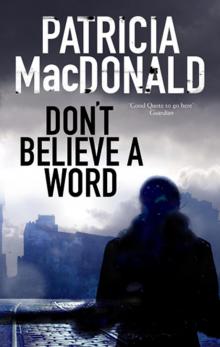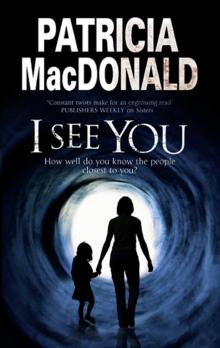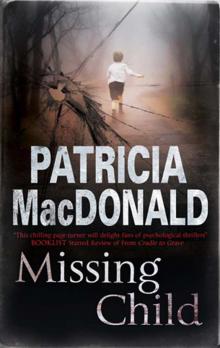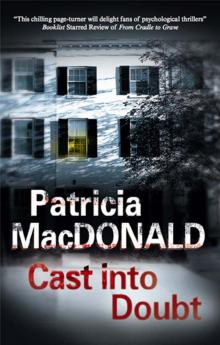- Home
- Patricia MacDonald
Not Guilty Page 3
Not Guilty Read online
Page 3
Keely glanced at him and then looked away. She hated to think how hurt he would be if he found out. She pressed her lips together and jingled the keys. “Dylan forgot something at a friend’s house. We’re just going to pick it up.”
“Oh, okay,” he said.
“Do you mind staying here with Abby? I know you probably have work to do.”
“Of course not. Didn’t you say you had to go to the mall? Why don’t you go while you’re out?”
“Oh, I can do it another time,” she said.
“No, go. Take your time. It’ll do you good to get out of the house. Don’t worry about us.”
Keely did need to do some shopping. Their anniversary was coming up, and she didn’t have a single gift for him. It was difficult to shop with Abby in tow. “Maybe I will, if you don’t mind,” she said.
“Mind?” he said incredulously, nuzzling Abby’s cheek. “Mind being here with my girl? Take as long as you need to. We’ll have a good time.”
Keely gave him a grateful smile and followed Dylan out to the SUV. She climbed into the driver’s seat, and Dylan clambered in beside her, slamming the door as hard as he could.
“Put your seat belt on,” she insisted.
Sullenly, he complied. She turned on the engine, then made a turn in the wide driveway. As she looked out her window, she saw Mark, still carrying Abby, come out and stand on the asphalt. Mark whispered something in Abby’s ear, and then he lifted her little hand and waved it. Getting the idea, Abby began to wave, grasping her father’s hair with her other hand so that he had to tilt his head toward the baby to avoid being scalped. The two of them wore matching, silly grins.
Waving back, Keely smiled ruefully at the sight of them.It’s so much easier with a baby,she thought.They may wear you out, but they don’t know how to hurt you yet.
2
After a few minutes of driving in silence, Keely asked, “Is this Jake a friend of yours?”
“No,” Dylan replied, as if stating the obvious.
“Well, who is he? How come you made this deal with him?”
“He wanted the bike. I wanted the money. I don’t see what’s so wrong with it. I thought it was my bike. Why can’t I do what I want with it?”
She hated that querulous tone that he took so often these days. It made her long for that faraway time when he looked up to her, literally and figuratively. “Because you did it to be spiteful,” she said. “Don’t pretend you didn’t.”
Dylan did not try to argue the point. “I don’t know why I have to bring the money over to his house like I’m in first grade.”
“Well, our actions have consequences, my friend. If you’re going to act like a six-year-old, I’m going to treat you like one. Maybe next time you’ll think twice before you do something so foolish.”
Dylan stared out the window, ignoring her.
“Dylan, what really bothers me is that you seem so intent on hurting Mark that you’ll give up something you really love, just to be mean to him. I saw your face when you got that bike. It was exactly what you wanted.”
“It was a bribe,” he muttered.
Keely pressed her lips together, refusing to take the bait. “Mark doesn’t need to bribe you, Dylan. He doesn’t need your approval. He bought you the bike because he knew you wanted it. And because he cares for you.”
“For you, you mean. And the baby.”
“No, I mean for you, too. Honey, I know it’s difficult to adjust,especially at your age, but there are some things you just have to accept in life. Our family has changed. You have a sister now, and a stepfather. They can both give you a lot of happiness if you let them. It’s up to you.”
“Obviously it’s easy for you,” he said scornfully. “Dad wasn’t even dead a week when you started going out with Mark.”
Keely sighed. It was not the first time he had hurled that insult at her. “I was not going out with him, and you know it. He offered to help me. That’s all it was. I needed his help at the time. Dylan, I wasn’t looking for someone to take Dad’s place. You know all this.”
“And I’m sick of talking about it,” he said. “There. That’s the house,” he said.
Keely glanced at him with raised eyebrows. “How do you know that’s the house? I thought you two weren’t friends.”
“I know where he lives, all right? That doesn’t make him my friend.”
Keely pulled the SUV into the driveway of the low, ranch-style house with a basketball hoop above the adjoining garage door. Keely stopped the car, turned, and looked at her son. “Look, I expect you to be a gentleman about this. You did something you shouldn’t have. Now you have to make it right. Is that clear enough?”
“If you say so,” he said.
“Dylan.”
“All right, all right—it’s clear.”
“Let’s go,” she said.
They walked up to the front door and Keely rang the bell. The door opened, and a woman with short, curly brown hair looked out at them. Her face was tense and drawn.
“Mrs. Ambler?” Keely asked.
“Susan,” she said, holding the door open. “Come in.”
“I’m Keely, and this is Dylan.”
“Come and sit down. Jake,” she called out.
A short, sandy-haired kid with a buzz cut came into the living room and stood awkwardly looking at them.
“Hey,” said Dylan.
“Hey,” said Jake in return.
“Dylan,” Keely prodded.
Dylan stared down in the vicinity of Jake’s shoes. “I have to get my bike back because I’m not allowed to sell it. I brought you your money back.”
“And . . .” said Keely.
“Sorry,” Dylan mumbled. He held out the wad of bills, and Jake reluctantly, after a warning glance from his mother, took them.
“Your bike’s in the garage,” he said. “My mom told me I wouldn’t be able to keep it anyway.” Jake did not seem overly distressed by the loss of the bike.
We all know when a deal is too good to be true,Keely thought.
“Right. Whatever,” said Dylan.
Keely and Susan exchanged a knowing glance. “Jake, go out and show Dylan where the bike is.”
“Okay,” said Jake. The two boys started for the front door. “Do you want to shoot some hoops?” Jake asked.
Before Dylan had a chance to reply, Keely interjected, “Not tonight, Jake. Dylan hasn’t done his homework. Why don’t you do it another day,” she said, trying to make it clear that it wasn’t their spending time together that she disapproved of. She just didn’t want Dylan to lose sight of why they’d come. “Dylan, I want you to get on your bike and go directly home.”
“You too, Jake,” Susan called after her son as the two boys went out the front door. “Homework.”
Keely turned back to Susan. “Thank you for calling me,” she said. “I’m sorry about all this.”
Susan made a dismissive gesture. “Believe me, I’m just so glad he didn’t steal the bike. Lately, I never know what to think.”
Keely recognized the troubled look in the other woman’s eyes. “I know what you mean,” she said. “Dylan has been pretty impossible lately.”
The other woman’s frown deepened. “Jake’s been . . . acting out. His father and I are . . . getting divorced.”
“Oh,” said Keely nodding. “Yeah. That’s tough on . . . everybody.”
“So, when he came home with this bike, I just assumed the worst.” It was almost as if Susan was trying to explain it to herself.
“Oh, believe me, I understand,” said Keely. She hesitated, and then she added, “The bike was a gift to Dylan from his stepfather.”
The other woman’s troubled gaze cleared slightly, and she nodded. “Oh,” she said. “Youdounderstand.”
“Oh, yes,” said Keely. “I sure do. Well, I’d better not keep you.”
Susan walked her to the door. Keely looked out and saw Dylan get on his bike and start down the driveway. “I’m sorry about all this,” said Keely.
>
“That’s okay,” said Susan. “And listen, Dylan is welcome to come over anytime. He seems like a good kid.”
“Thank you,” said Keely, meaning it. “He could use a friend.”
Keely walked down Susan’s driveway and got into the Bronco. Despite Mark’s insistence that she take her time, Keely felt as if she should head back. She was thinking of Abby’s bath and Dylan’s homework. But she was also reluctant to go right back home. It was a rarity for her to be out of the house without Abby. The stores were open late, and she knew Mark would have a nice gift for her for their anniversary. He was thoughtful that way. Reminding herself that Mark had urged her to go, she turned the car around in Susan Ambler’s driveway and headed to the mall.
AFTER AN HOUR,during which she tried in vain to figure out Mark’s criteria for picking out his ties and to remember which of the jazz albums were or were not part of his collection, Keely felt frustrated with herself.You should know these things,she thought. She had been so distracted lately with all the decisions about the house and caring for a baby. It had been that way ever since they got married, it seemed. One huge change after another. There didn’t seem to be any time for the details of life. But things were bound to settle down soon. In the meantime, she still had to find Mark a present.
Keely finally went into the mall bookshop, where a huge cardboard display of the latest John Grisham legal thriller was set up beside the cash register. It seemed like kind of a predictable gift for a lawyer, but it wasn’t as if Mark had some hobby she could find a book about. The truth was that Mark didn’t read very much, but she had heard himmention the Grisham book one morning while he was reading the paper. His exact remark had been that John Grisham made a better living as an author than he ever could as an attorney. But when she questioned him further, he had said that the book sounded interesting. Keely frowned at the cover, read the dust jacket again, and then handed the book across the counter to the clerk.
“Will that be it?” the bearded young man asked, noting her hesitation.
Keely felt a little guilty because giving a best-seller like this to her husband seemed sort of . . . lazy.Now, stop it,she thought. There were plenty of best sellers she’d enjoy receiving as a gift. Keely nodded. “Yes. I’m sure he’ll like that.”
While the clerk rang it up, Keely continued trying to reason away her feelings of guilt. At least this proved she was paying attention to their breakfast conversation. Sometimes, she felt as if she shortchanged him, between the new house and the children. Not that he complained. He seemed content to be near her, no matter how preoccupied she might be.
The clerk, noting the expression on Keely’s face said, “He can always bring it back.”
“No, I’m sure it will be fine,” said Keely. She couldn’t imagine Mark bringing anything back. He had no patience at all for shopping. He had given her carte blanche when she decorated the house, although he dutifully admired her every purchase, constantly reassuring her that he liked her taste and that none of her choices were too expensive.
“Do you want it wrapped?”
“Could you?” Keely asked.
“Sure,” said the clerk, disappearing into the office behind the counter.
Keely gazed at the selection of bookmarks and calendars at the counter, then flipped through a literary magazine on display there while she waited. It troubled her a little that she had found it so difficult to buy Mark a present. Of course, his gifts to her were never especially imaginative. He always went the jewelry-and-flowers route, but his extravagance made her gasp and his choices were elegant. It was somuch more difficult to buy something for a man, especially a man like Mark who insisted that he had everything he wanted. He always said that she had given him the most precious gift—a home and a family. Considering his lonesome childhood, Keely had found that both understandable and endearing.
But they’d never really had that honeymoon time, a chance to be together—just the two of them. No wonder she had trouble choosing a tie for him. They’d hardly had time to breathe in the last two years. In a way, she thought, they’d done the hard part first. The fun part, the “getting to know you” part, unfurled before them like a leafy lane in summer.
ASKEELY RETRACEDher route toward home, she considered having a little party for their anniversary. Immediately she began to formulate a menu. But the guest list was more problematical. Although she’d met a lot of people in St. Vincent’s Harbor, she didn’t really know many of them all that well. She’d need Mark to tell her who to invite. But he would probably like the idea of a party—a chance to show off the new house and his baby girl.
They hadn’t entertained here yet—except for Lucas and Betsy, of course, and Richard’s mother, Ingrid. But that was family. A party called for people their own age, music, and wine. It had been simpler with Richard, living as they did in a university environment. A pot of chili and a big bottle of Gallo red had sufficed for their dinners. Besides, with Richard’s headaches, they weren’t able to plan ahead for a party. Every invitation was impromptu. But this—this was different. She couldn’t help seeing this kind of party as more of a test. People would be looking her over, sizing her up. Mark’s wife. The woman he married instead of the attorney he’d been engaged to.
Oh well,she thought.It’s your idea. No one’s forcing you to do it. And the first time is the worst. Just get it over with, and before you know it, you’ll have friends dropping by for chili again, even in this fancy neighborhood.Distracted by the logistics of hostessing, Keely almost missed the turn that led to their secluded street. Just as she slowed the car down and put on the signal, a police car, its light flashing and siren wailing, sped up from behind her and wheeled around the corner.
I wonder what that’s all about,she thought. She could hear them now—more sirens in the distance. Instinctively, her heart began to pound. As she rounded the curve that led to her house, she saw a cluster of flashing lights and a congregation of vehicles in the distance.No,she thought.Oh no—it can’t be us.She mentally counted the houses that stood on the street. There weren’t too many. Each house had a large lot around it. Next door to them was Dr. Connelly, an elderly widower who lived with his daughter Evelyn.That’s probably it,Keely thought. The retired physician was in his eighties and suffering from Alzheimer’s. Why, even his daughter had to be nearly sixty.
Keely was actually hoping it was Dr. Connelly.Anything,she thought,but my house, my kids.There was no smoke in the air, no fire trucks. Just police, and an ambulance.A heart attack. It has to be,she thought, although she, of all people, knew it might very well be something else. Keely’s car crawled up the street, hampered by the arriving emergency vehicles. She gripped the wheel fiercely. As she drew closer, she counted the houses and she knew. It was not the Connellys’ house. It was one house farther up. Her heart thudding, her mouth dry, she pulled the SUV up, stopped it short behind a patrol car with a squeal of brakes, and jumped out. There were groups of people standing in knots on the front lawn, looking curiously up at the house. They turned to stare at Keely. Mark and the children were nowhere in sight. Keely began to run up the lawn toward her house. Even more than the emergency vehicles, there was something chilling about the sight of that front door, which was gaping open, as if privacy no longer mattered.
3
Ayoung patrolman tried to block her entry by gripping her forearm. “Let go of me,” she hissed. “I live here.” The young man dropped her arm as if it were hot and stepped back, averting his eyes. Keely saw that he wanted to avoid her gaze, and his obvious discomfort was chilling. She looked around her house as if it were a foreign place. It was filled, as if in a nightmare, by people she didn’t recognize. “Mark,” she cried, and then looked at the young cop accusingly. “Why are these people here? Where is my husband? My children?”
“Are you Mrs. Weaver?” he asked.
“Yes,” said Keely. “What are you doing here?”
“You’d better come with me, ma’am,” he said softly.
“Why? What is this all about?”
“Right this way, ma’am,” he said. He cleared a path for her through the uniformed strangers who were clustered in her living room.
She could hear a baby crying now. Abby. “Where is my husband?” Keely demanded. “My son?”
“The sergeant will explain,” the young officer said stiffly as he escorted her through the French doors to the patio. The patio was lit by fairy lights on the trees and by the light that filtered out from the house. Beyond the patio, the pool was illuminated. It glowed, gemlike, a pale blue lozenge afloat in the darkness. There were more strangers, everywhere she looked. Police, people in hospital scrubs, emergency personnel. Then, in the midst of the confusion, Keely saw a familiar face. It was Evelyn Connelly, her next door neighbor. The pudgy woman, who was wearing a sweatsuit with a strand of pearls, was gesturing widely as she spoke to a sober-looking police officer with a gray mustache. Theman nodded, but his gaze traveled to Keely. Evelyn turned, and her eyes widened as she recognized her neighbor. She tilted her head to one side and regarded Keely with a pitying glance.
“Evelyn,” Keely cried, as if she were a long-lost friend.
The older woman approached and grasped Keely’s hand in her own puffy, liver-spotted hand with its weighty diamond ring. “I’m sorry,” she said, as if in answer to Keely’s unspoken question. “I called them. I went to let the dogs out, and I heard the baby screaming. It went on for a long time. I was afraid it would upset Dad—he gets agitated by that kind of thing. So I came over to check.”
The gray-haired officer approached Keely. “Are you Mrs. Weaver?”
“What is it?” Keely demanded. “What’s going on? Where is my husband? Where’s my baby? And my son?”
“You have to be very brave now, dear,” said Evelyn, gripping her hand. “This is not easy.”
A couple of people looked up at Keely, and then away. A woman in a short-sleeved blue uniform with a stethoscope around her neck was holding Abby. Keely yelped with relief and reached out for her child. She clutched the baby to her chest. Everything Abby wore—her hair, her little shoes—was wet and icy cold. Keely looked at the baby in confusion. “You’re all wet,” she said wonderingly.

 I SEE YOU an unputdownable psychological thriller with a breathtaking twist
I SEE YOU an unputdownable psychological thriller with a breathtaking twist Sisters
Sisters Don't Believe a Word
Don't Believe a Word The Girl in the Woods
The Girl in the Woods Not Guilty
Not Guilty I See You
I See You Missing Child
Missing Child Cast into Doubt
Cast into Doubt